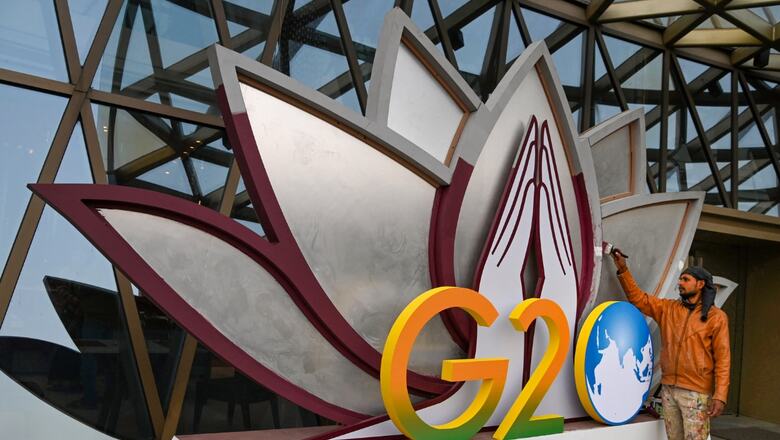
views
In the run-up to the G20 Summit, reams have been written in the West about India’s dilemma: how will it go beyond its neutral stance on the Russia-Ukraine war? Adding to the basic pressures of being this year’s G20 president and hosting a major summit, India’s influence is also being put to the test. Inevitably, some will judge the success of India’s presidency by its ability to evolve enough of a consensus so that the summit communique offers an effective denunciation of Russia’s aggression.
For his part, Russian President Vladimir Putin is not only skipping the summit, but Russia’s Foreign Minister has already threatened to block a declaration if the joint statement doesn’t include their perspective on Ukraine. Even Russia’s cohort, China’s President Xi Jinping, has decided to forgo the summit.
So far, differences on positions between the core G7 members and the Russia-China grouping on Ukraine have meant that all ministerial meetings during India’s presidency have ended without a joint communique that reflects a consensus on other critical issues beyond the war.
New Delhi has appealed to all G20 summit participants that the focus should be on development and the group shouldn’t get bogged down by the issues of war.
Indian sherpas are hoping that the summit will help to bridge the expectation gap between the G20 and other developing nations. Towards making the G20 truly global in its outlook, India is hopeful of inducting the African Union (AU) as part of the elite club.
Ahead of the summit, Prime Minister Narendra Modi has said: “A divided world will find it difficult to fight common challenges.”
It isn’t as though Modi is implying that countries around the world should not be on the right side of history on Ukraine, in what has been termed a “defining contest between democracy and autocracy”.
In fact, his reminder to Putin that “this isn’t an era of war, but one of dialogue and diplomacy and we all must do what we can to stop the bloodshed and human suffering” is an affirmation of India’s commitment to a rule-based global order. To be sure, even the slogan on the G20 logo drawn up by New Delhi to mark its presidency emphasises that only mutual co-existence can guarantee the future of humanity.
Thus, while India may not have sided with any one bloc, it has made it abundantly clear it’s on the side of world peace. In fact, other nations of the Global South have followed India’s lead in maintaining an enlightened equipoise.
The reasons for this are not hard to fathom. It can be argued that, post-pandemic, many nations beyond Europe are faced with a litany of crises that have little to do with the Ukraine war – rising debt, crippling inflation, food and energy shortages, societal inequity and the devastating climate inclemency induced by global warming.
The Ukrainian conflict is a legacy of the long-standing, and yet-to-be-completed, Western post-Cold War project of reconfiguring Europe into a unified whole – a powerful heartland in the Northern Hemisphere that can counterbalance a rising Asia.
This self-absorption of the West and the new iteration of its ‘great game’ at the expense of neglecting critical issues facing the rest of the world has become a sore point among many nations of the Global South.
Standing under the long shadow cast by the self-serving objectives of the elites of the G20, it’s easy to lose sight of why the grouping was founded.
After the 1999 Asian financial crisis, which came after a cycle of global financial meltdowns, the G7 created a larger forum to find fair and inclusive solutions to the economic distortions and inequities catalysed by globalisation. It was always meant to be a platform for geo-economic ideating and not a stage for geo-political score-settling.
However, today, the elite powers that dominate the G20 seem to be more interested in providing politically expedient fixes to geo-economic problems.
Some examples stand out. First, the sanctions on Russia. While the reasons for imposing them are unimpeachable, the West’s motives are being increasingly called into question.
Are the sanctions – especially those imposed on Russia’s most lucrative oil and gas exports – an attempt at imposing crippling costs on Moscow or are they more about uniting the world behind the West in a contrived popularity contest? If they are about depleting Russian capacity to finance the war by choking its oil money, then why is the European Union buying Russian natural gas through third parties? This inexplicable hypocrisy is undercutting the impact of slapping sanctions on Russia. In fact, Russia’s economy, albeit from a low base, has expanded 4.9% year-on-year in the second quarter of 2023, primarily on energy exports.
Former foreign secretary Shivshankar Menon observes that even the West’s attempt to chastise China for its support for Russian adventurism through solutions like “Friend Shoring” are driven by politics “with little or no regard for price consequences on global manufacturing or value chains”.
China, the most primed among non-Western nations to offer an alternative to Western materialism, has also failed the Global South. Beijing, under Xi Jinping, projects influence abroad using some of the same crude instruments of diplomacy that have alienated the Global South from the US-led Western order.
Little wonder that emerging powers like India are feeling increasingly alienated from the two contending blocs. While an alternative third way is yet to emerge, India is hoping that the agenda it is pursuing at the G20 Summit will serve as a gateway to internal reforms that make existing institutions more inclusive and aligned to the needs of all the world, not just one predominant section of it.
Perhaps this is why India believes that, more than finding consensus on Ukraine, getting an agreement that includes the African Union (AU) in the G20 will birth a more representative platform that works for the global good. One can only hope the elite members of the G20 listen and agree.
Rahul Shivshankar is Consulting Editor at Network18. He tweets at @RShivshankar.



















Comments
0 comment